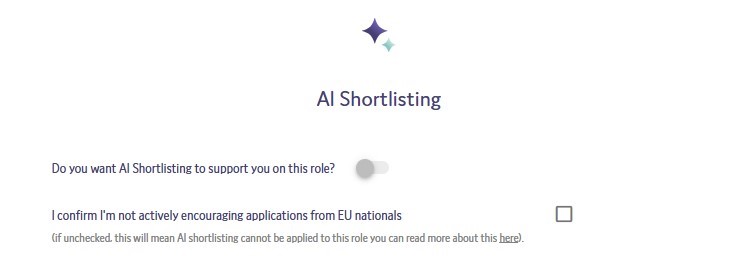 573
573
Our AI shortlisting feature is designed to help you efficiently find the best applicants for your vacancies. It’s built with fairness, inclusivity, and UK legal compliance in mind. However, due to evolving global legislation around artificial intelligence—particularly the EU AI Act—we want to highlight an important consideration if you're hiring for roles based in the EU or actively encouraging applications from EU nationals.
What is the EU AI Act?
The EU Artificial Intelligence Act is a comprehensive set of regulations governing the development and use of AI across the European Union. It categorises AI systems based on their potential risk to individuals, and includes stricter rules for what it considers high-risk systems—such as AI tools used in employment and recruitment.
Although our AI shortlisting feature is designed with responsible principles and transparency, we have not sought certification under the EU AI Act. This is mainly because:
- Our customers are solely based in the UK and not currently subject to these EU-specific requirements.
- The process to achieve full EU AI Act compliance is lengthy, complex, and still evolving.
Why does this matter to you?
If you're recruiting for a job located in the EU or if your vacancy explicitly encourages EU nationals to apply, you should avoid enabling AI shortlisting for that specific role (see image below):

This recommendation is based on a legal concept called extraterritoriality.
🧾 What is "extraterritoriality"?
Extraterritoriality is a legal term that means laws from one country or region can still apply outside their borders, if they affect that country’s citizens or interests. In this case, the EU AI Act can apply even if the company or the AI system is based outside the EU, if the AI is used to process data from EU citizens.
💬 What does this mean in plain English?
Put simply: the EU wants to protect its citizens' data, no matter where it’s processed. So, if an EU national applies for a job and their data is assessed by an AI system, that system could theoretically fall under the EU AI Act.
Why the EU AI Act doesn’t apply to most UK-based roles
We're confident that the EU AI Act does not apply in most cases where AI shortlisting is used for UK-based roles and where you are not actively targeting EU applicants. The principle here is intent and targeting. If your job advert is aimed at candidates in the UK and does not explicitly market to those residing in the EU, then the use of AI to process those applications would typically fall outside the scope of the EU’s jurisdiction.
This is similar to how you wouldn’t be expected to comply with Australian or U.S. AI legislation simply because a citizen of those countries applies for a job in London. Just as the UK does not require foreign employers to follow its laws when handling UK citizen data abroad, the EU does not automatically impose its AI rules on UK businesses unless there is direct targeting or processing of EU-based individuals. What matters is whether the job is marketed within the EU or intended for EU-based recruitment—not merely the citizenship of the applicant.
Our recommendation
To stay on the safe side:
-
✅ Do use AI shortlisting for roles based in the UK
-
❌ Don’t use AI shortlisting for roles located in the EU, or where your advert explicitly invites applications from EU nationals.


